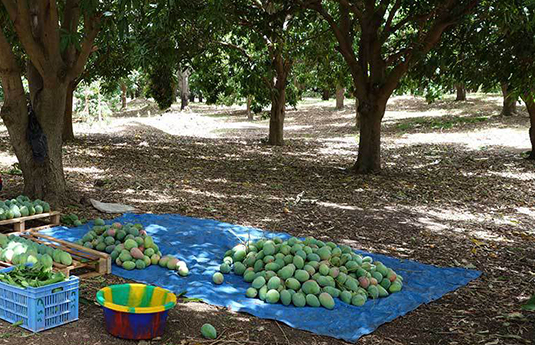
Greenyard conducts sustainable business with all the parties in its supply chain, from farm to logistics.
The perfect summer snack: a healthy salad, smoothie or pie garnished with mangos. But how did that fresh mango end up on your plate? We guarantee the highest-quality fruits and vegetables by conducting sustainable business with every stakeholder in the supply chain. Let’s trace the journey our mangos have taken from fork to field.
Growing demand for mangos
Healthy food is gaining in popularity, and what better healthy snack than a fresh mango? At least, that’s what Europeans seem to believe: their demand for fresh mangos is growing by 5% each year. But not just any mangos will do: both consumers and retailers care about how their fruit is socially and environmentally being sourced. Sustainable and ethical sourcing make the mango a truly guilt-free snack.
Transportation by boat
We embrace the responsibility of ensuring a sustainable supply chain with minimal impact on the environment. To do so, we continuously improve the transportation of our products. The mangos are transported by trucks from Mali to Ivory Coast and Senegal, where they are shipped to Rotterdam by sea. From there, they are distributed across Europe. At all times, we strive to maintain the shortest-possible supply chain.
Mali mango farmers
Mali is the perfect sourcing location for mangos. Because the ideal climate provides optimal conditions for abundant harvests and reduced use of chemical fertilizers or pesticides. Moreover, 80% of the workforce in Mali is active in the agricultural sector, which exports as much as 575,000 tonnes of produce per year. By applying our technical expertise in market demand, we improve the process of exporting fresh mangos to the EU.
Besides boosting the local economy, we also improve the wellbeing of all people involved in the supply chain. Together with the GIZ and Bayer, we work on a holistic approach in providing technical training sessions including ethical and environmental aspects for mango growers, harvesting teams, exporters and local supporting institutions. The results are impressive: an average productivity increase of 30%, improved quality leading to 50% higher gross margins for smallholders, the creation of additional jobs within the industry and consequently increased income benefitting approximately 6,500 people. At the household level the increased income tends to be invested in food (improving food security), children's education, health and access to electricity..
As the physical distance from fork to field increases, food supply chains are growing ever longer and more complex. However, we believe that it is our responsibility to do business as sustainably as possible.
Discover our approach to responsible sourcing in our sustainability report.
